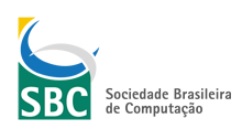Uma Ontologia para a Representação de Sistemas Multiagentes Culturais
Resumo
A inclusão de elementos culturais nos Sistemas Multi-Agentes possibilita o compartilhamento de padrões de comportamento entre os individuos de sistemas abertos, promovendo a coordenação e cooperação. Para auxiliar na tarefa de modelagem de tais sistemas, este artigo propõe a utilização de uma ontologia que permita ao analista, além de representar o sistema, fazer asserções lógicas – verificando assim, a consistência do sistema e, por conseguinte, identificar possíveis conflitos em tempo de design.Referências
Antunes, L. (1997) “Towards a model for value-based motivated agentes”, In: Proceedings of MASTA97.
Boyd, R. (1988). “Culture and the evolutionary process”. University of Chicago Press.
Dechesne, F., Di Tosto, G., Dignum, V. and Dignum, F. (2013) “No smoking here: values, norms and culture in multi-agent systems”, In: Artificial Intelligence and Law, v. 21, n. 1, 79 – 107.
Figueiredo, K. (2011) “Modeling and Validating Norms in Multi-Agent Systems”, Master’s Thesis, Universidade Federal Fluminense, Instituto de Computação.
Figueiredo, K. S., da Silva, V. T. (2013) “Identifying Conflicts between Norms and Values”, In: International Workshop on Coordination, Organizations, Institutions and Norms in Agent Systems (COIN@AAMAS 2013), Saint Paul, MN, USA.
Gruber, T. R. (1993). A translation approach to portable ontology specifications. Knowledge acquisition, 5(2), 199-220.
Heinrich, S., Eberling, M., and Wermter, S. (2011). Determining Cooperation in Multiagent Systems with Cultural Traits. In: ICAART (2), 173 – 180.
Keesing, R. M. (1974) “Theories of culture”, In: Annual Review of Anthropology 3, p.73 – 97.
McBreen, J., Di Tosto, G., Dignum, F., and Hofstede, G. J. (2011). Linking norms and culture. In: Culture and Computing (Culture Computing), 2011 Second International Conference, IEEE, 9 – 14.
Rokeach, M. (1979) “The Nature of Human Values”, The Free Press. NY: Free Press.
Schwartz, S. and Bilsky, W. (1987) “Toward a universal psychological structure of human values”, In: Journal of Personality and Social Psychology 53(3).
Boyd, R. (1988). “Culture and the evolutionary process”. University of Chicago Press.
Dechesne, F., Di Tosto, G., Dignum, V. and Dignum, F. (2013) “No smoking here: values, norms and culture in multi-agent systems”, In: Artificial Intelligence and Law, v. 21, n. 1, 79 – 107.
Figueiredo, K. (2011) “Modeling and Validating Norms in Multi-Agent Systems”, Master’s Thesis, Universidade Federal Fluminense, Instituto de Computação.
Figueiredo, K. S., da Silva, V. T. (2013) “Identifying Conflicts between Norms and Values”, In: International Workshop on Coordination, Organizations, Institutions and Norms in Agent Systems (COIN@AAMAS 2013), Saint Paul, MN, USA.
Gruber, T. R. (1993). A translation approach to portable ontology specifications. Knowledge acquisition, 5(2), 199-220.
Heinrich, S., Eberling, M., and Wermter, S. (2011). Determining Cooperation in Multiagent Systems with Cultural Traits. In: ICAART (2), 173 – 180.
Keesing, R. M. (1974) “Theories of culture”, In: Annual Review of Anthropology 3, p.73 – 97.
McBreen, J., Di Tosto, G., Dignum, F., and Hofstede, G. J. (2011). Linking norms and culture. In: Culture and Computing (Culture Computing), 2011 Second International Conference, IEEE, 9 – 14.
Rokeach, M. (1979) “The Nature of Human Values”, The Free Press. NY: Free Press.
Schwartz, S. and Bilsky, W. (1987) “Toward a universal psychological structure of human values”, In: Journal of Personality and Social Psychology 53(3).
Publicado
28/05/2014
Como Citar
MARQUES, Vinícius de Figueiredo; FIGUEREDO, Karen da Silva.
Uma Ontologia para a Representação de Sistemas Multiagentes Culturais. In: WORKSHOP-ESCOLA DE SISTEMAS DE AGENTES, SEUS AMBIENTES E APLICAÇÕES (WESAAC), 8. , 2014, Porto Alegre/RS.
Anais [...].
Porto Alegre: Sociedade Brasileira de Computação,
2014
.
p. 149-154.
ISSN 2326-5434.
DOI: https://doi.org/10.5753/wesaac.2014.33294.



